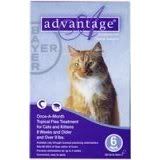 Not too long ago the ASPCA® (The American Society for the Prevention of Cruelty to Animals®) released data indicating that cats are more susceptible to illness and death as a result of the misuse of spot-on flea and tick control products.
Not too long ago the ASPCA® (The American Society for the Prevention of Cruelty to Animals®) released data indicating that cats are more susceptible to illness and death as a result of the misuse of spot-on flea and tick control products.
The data, collected by the ASPCA Animal Poison Control Center, also indicate the overwhelming majority of animal illnesses associated with proper use of spot-on flea and tick control products are mild.
“Products labeled for dogs must never be used on cats—doing so can result in serious illness and even death,” says Dr. Louise Murray, Medical Director of the ASPCA’s Bergh Memorial Animal Hospital. “A veterinarian must always be consulted before using spot-on flea and tick treatments on very young, old, sick or pregnant pets.”
The ASPCA receives more than 700 calls daily from veterinarians and pet parents, resulting in over 150,000 annual cases involving medications, insecticides, plants and foods.
ASPCA epidemiologist Dr. Margaret Slater analyzed data from public calls managed by the ASPCA regarding flea and tick products. The data identified two key findings.
1. When cats were treated inappropriately (not per label directions), they are significantly more likely to experience severe reactions: no illness despite a call to the ASPCA (18%), mild illness (17%), moderate illness (45%), major illness (19%), and death (2%).
2. When dogs and cats were treated correctly (per label directions), the likelihood of severe adverse reaction was significantly less: no illness despite a call to the ASPCA (7%), mild illness (69%), moderate illness (22%), major illness (2%), and death (0.1%).
“The important take home message is that although adverse reactions can occur with all flea and tick products, most effects are relatively mild and include skin irritation and stomach upset,” says Dr. Steven Hansen, ASPCA veterinary toxicologist and Senior Vice President Animal Health Services. “Pet parents should not discontinue using products as directed by the product label when faced with a flea infestation.”
Using products as directed and making necessary adjustments based on health will greatly reduce adverse reactions from flea and tick or any other medical products.
Fleas cause anemia (low blood counts), carry tapeworms, and can transmit infections such as Bartonella; ticks transmit many diseases including Lyme Disease and Rocky Mountain Spotted Fever. The risk to pets from these diseases is greater than the risk of adverse reactions when products are use appropriately.
Find more at the ASPCA Pressroom


